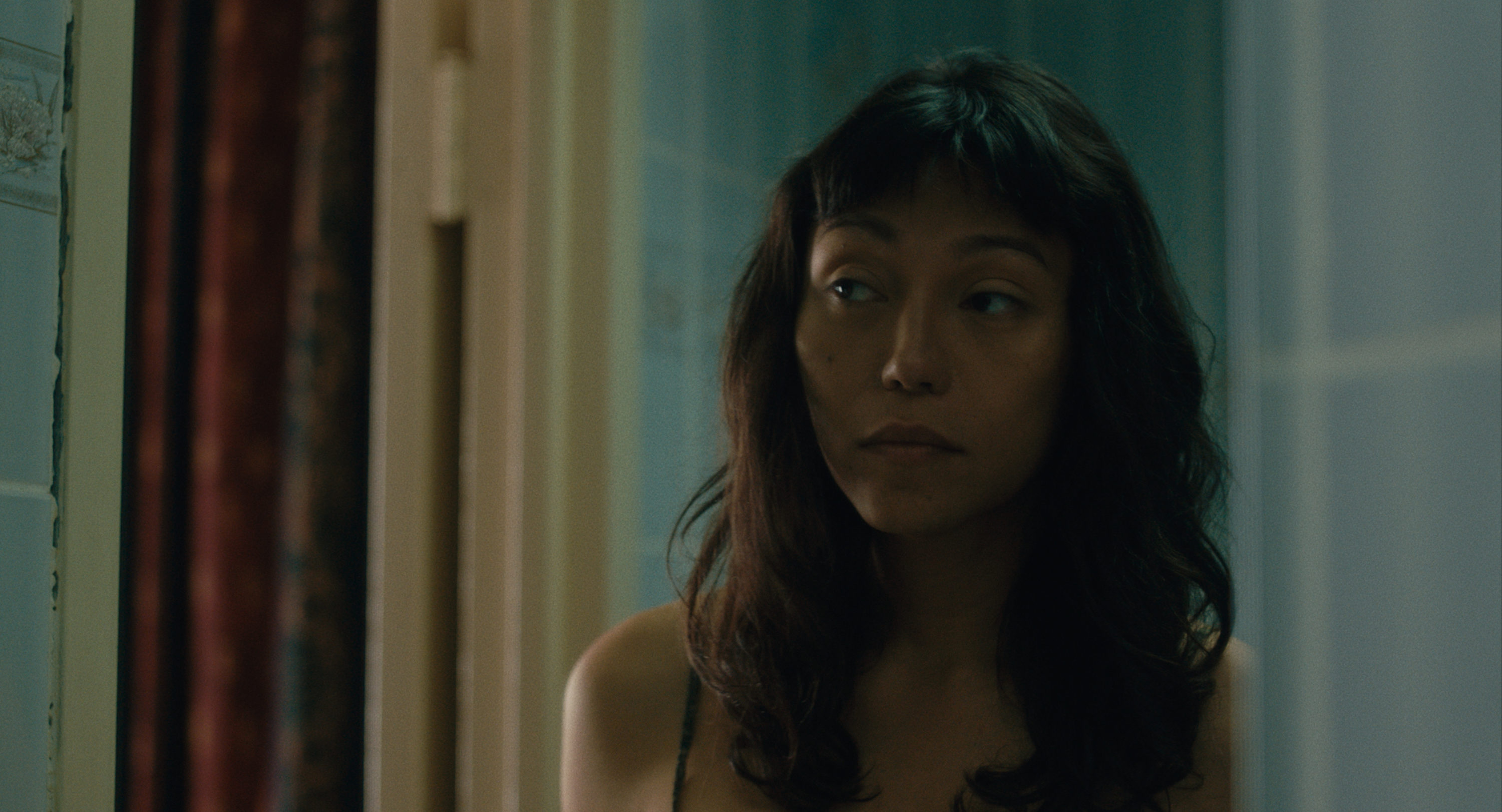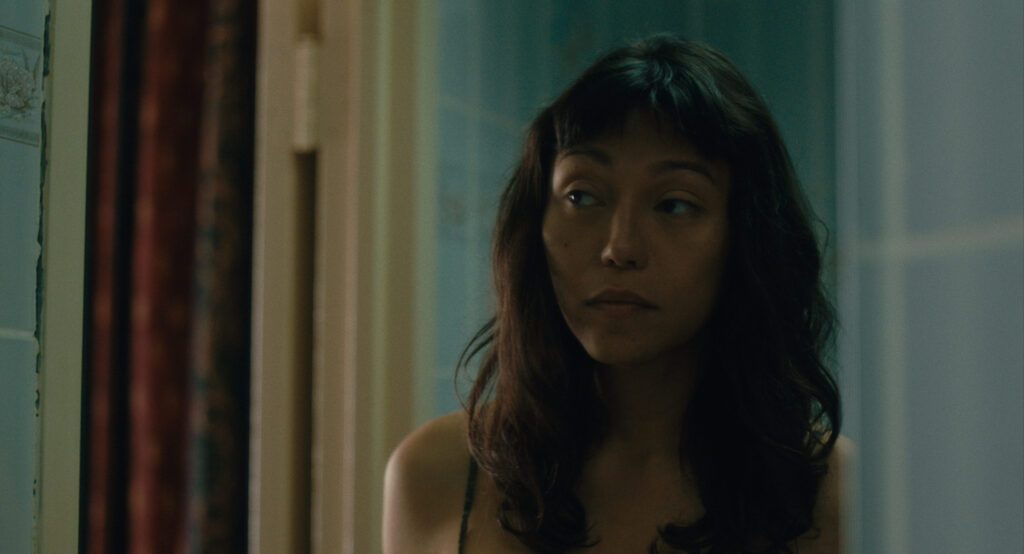Support the news
Review

The first time we get a good look at Olivia she’s reflected in the triple panels of a bathroom medicine cabinet mirror. From the angle at which she’s washing her face, we can see semi-obstructed three-quarter profile views of her on either side, but the mirror in the middle is empty. We get fragments of a person, never the full picture. This absence at the center of the frame is a canny thematic introduction to writer-director Isabel Sandoval’s “Lingua Franca,” a moody, mysterious romance that just dropped on Netflix this week following a long, history-making run on the international film festival circuit, including Venice, London and last month’s virtual incarnation of Boston’s own Wicked Queer.
“Lingua Franca” was the first feature film by a trans woman of color to play a lot of those places, but the movie doesn’t carry itself like a trailblazer. On paper, it might sound like your standard social issue melodrama, but on screen, it’s something dreamier and more elusive. Set in Brooklyn’s Brighton Beach neighborhood, this is a uniquely American story about self-reinvention in a nation of immigrants. Writer-director Sandoval (who also edited and produced the picture) stars as Olivia, an undocumented Filipina working as a caretaker for Olga, an elderly Russian woman with dementia played by the late, great Lynn Cohen in one of her final performances.

Olivia sends most of her money back to her mom in the Philippines, squirreling the rest away so she can pay someone to marry her for a green card. She had a guy all set to walk down the aisle for five grand, but then he went and fell in love with someone else. Her passport is going to be a problem anyway, ever since her home country passed a law forbidding trans citizens to update their gender. Olivia is keenly aware she’s here on borrowed time — the last caretaker working in her position was deported — and with ICE raids popping off all over the neighborhood, she’s becoming understandably paranoid.
Now she’s also got to put up with Olga’s ne’er-do-well grandson Alex (Eamon Farren), just out of jail and crashing at the apartment until he can get his act together. His fed-up family pulled some strings to get him a job at a slaughterhouse that will be a great second chance if he can manage to show up sober. To his credit, the guy shows some signs of trying to straighten up and fly right, at least when he’s not down at the bar with his knucklehead buddies. Stuck together in cramped living quarters, Alex and Olivia are initially standoffish, but then curiosity starts creeping in. It doesn’t take too long for them to figure out how hot they are for each other.
“Lingua Franca” is a sometimes startlingly sexy movie, but the eroticism is tinged with unease. Olivia, by necessity, plays things close to the vest. She’s all too aware of how precarious her position is, even without the constant yammering on the radio by you-know-who about “sending them back” and the crude transphobic slurs uttered by strangers. Alex still isn’t used to life having consequences — he seems to blow up his relationships and opportunities arbitrarily and then scramble to put them back together again. (Unspoken in the film but obvious: it always works because he’s a white dude from a good family.) The guy’s great at starting over just so he can wreck everything again, and it’s with a sinking feeling that you realize he’s beginning to see Olivia’s secrets as leverage. She’ll have to keep loving him because of what he can do to her life if she doesn’t.

Some of the psychological games here can get a little too opaque for their own good. Sandoval is not the kind of filmmaker to tell us what her characters are thinking, and there’s no intrusive music leading our emotions around. I’m not sure that Farren, an Aussie actor who played Audrey Horne’s doomed demon spawn on “Twin Peaks: The Return,” has quite enough of the scuzzbucket charisma that the role requires. Or maybe I’m just being a little overprotective of Olivia, as despite her tough, exterior shell I haven’t feared for a fictional character like this in some time. Sandoval’s steely performance is a minimalist marvel, her eyes offering fleeting glimpses of subjects she would rather not talk about right now, thank you very much.
The textured, shadowy cinematography by Isaac Banks lends these locations an occasionally haunted aura despite the bustling crowds. Unlike a lot of movies set in New York, people actually seem to live in this city, and not just attractive professional extras, but families and the elderly as well. Sandoval knows her cinema history: there’s a neat structural nod to Chantal Akerman’s “News from Home,” as Olivia’s phone calls with her mother play out against static shots of a sleeping city stirring to life, and her beaches have a grey-skied melancholy that calls to mind the gloomy, wind-swept boardwalks of James Gray’s “Two Lovers” or Bob Rafelson’s “The King of Marvin Gardens.”
Sandoval’s fluent images often outpace her dialogue, but in part what makes the film’s title so bitterly ironic is that besides sex, there really is no bridge language between Olivia and Alex’s disparate worlds. “Lingua Franca” returns again to a three-mirrored composition for one of the film’s final scenes, not in the bathroom but rather a crummy Coney Island motel room where Olivia has at last reclaimed her agency. This time the reflections reveal her in full.
“Lingua Franca” is now streaming on Netflix.





